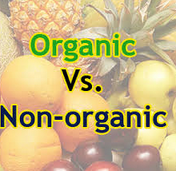 While organic crops supposedly aren t treated with synthetic pesticides or fertilizers, a recent report suggests that isn t always true. The author cites a 2012 USDA study that found while few of the nearly 600 sample studied for synthetic pesticides had levels that exceeded the EPA/USDA safety levels, many had such contamination below those levels. When they were added up, over 40 percent of the samples had at least traces of synthetic pesticides. While this means nothing for health or safety, it does mean that those touting the supposed purity of organic foods are leading their followers astray. How does this happen? Is it fraudulent practices by farmers, or is it drift from nearby non-organic fields?
While organic crops supposedly aren t treated with synthetic pesticides or fertilizers, a recent report suggests that isn t always true. The author cites a 2012 USDA study that found while few of the nearly 600 sample studied for synthetic pesticides had levels that exceeded the EPA/USDA safety levels, many had such contamination below those levels. When they were added up, over 40 percent of the samples had at least traces of synthetic pesticides. While this means nothing for health or safety, it does mean that those touting the supposed purity of organic foods are leading their followers astray. How does this happen? Is it fraudulent practices by farmers, or is it drift from nearby non-organic fields?
While neither of these possibilities can be completely ruled out, a former USDA organic farm inspector, Mischa Popoff, says neither of these is likely to account for all the contamination seen. Instead, he points to inspectors lack of ability to test crops in the field, which they can t do now. He points out that without such testing while planting and growing are in process, an inspector can t say whether the farmer is cheating or if prohibited substances are simply drifting from conventionally-grown fields in the vicinity.
Further, apparently the USDA doesn t actually require much testing for organic certification at any point in the production process. Rules promulgated in 2013 require that organic certifiers test samples from at least 5 percent of the operations they oversee that doesn t really translate into much oversight.
This whole matter is nothing more than a tempest in a teapot, says ACSH Senior Nutrition Fellow Dr. Ruth Kava. Our position has always been that organic foods are no better than conventionally-produced ones in terms of either safety or health. Thus the finding of this so-called contamination by traces of synthetic chemicals will not affect either one. The only issue here is whether or not supposedly organic foods are being fraudulently marketed as such and that s a legal, not a scientific issue.


